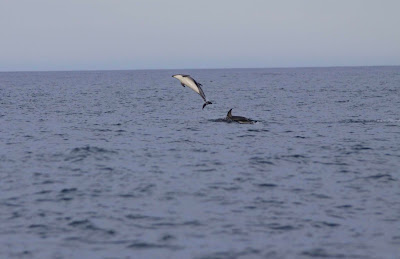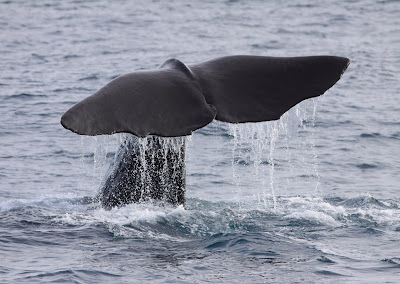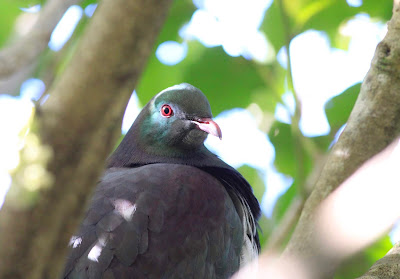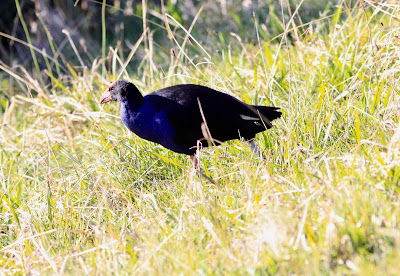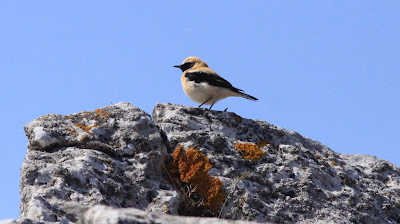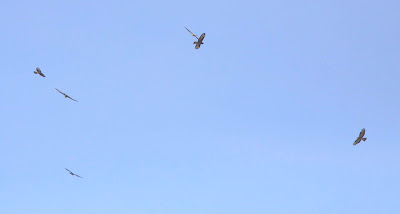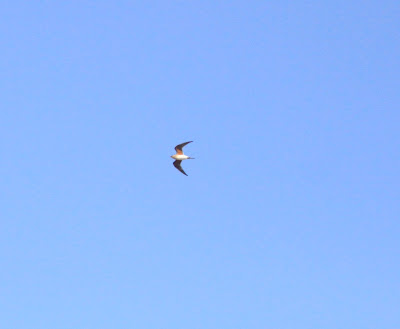Not far from Dunedin on the south island is the Otago Penninsula. Here you can visit the Royal Albatross Centre, and take an escorted trip to a private reserve/beach to see the penguins, and New Zealand Sea Lion; another New Zealand endemic.
Monday, 26 August 2019
The rarest penguin in the world - Yellow Eyed Penguin
Along with the Galapagos Penguin, the Yellow Eyed Penguin, which is a New Zealand endemic, is the rarest penguin in the world, with less than 4000 individuals.
Not far from Dunedin on the south island is the Otago Penninsula. Here you can visit the Royal Albatross Centre, and take an escorted trip to a private reserve/beach to see the penguins, and New Zealand Sea Lion; another New Zealand endemic.
Not far from Dunedin on the south island is the Otago Penninsula. Here you can visit the Royal Albatross Centre, and take an escorted trip to a private reserve/beach to see the penguins, and New Zealand Sea Lion; another New Zealand endemic.
Sunday, 11 August 2019
Albatrosses and other sea birds, Kiakoura, New Zealand
One of the added benefits of a whale watching trip is the opportunities it provides to see sea birds Kiakoura
We wrapped the trip up with hundreds of Dusky Dolphins accompanying the boat as we headed back to shore.
Shy Mollymawk
Shy Mollymawk is a "small" albatross, of which there are numerous forms/subspecies
Giant Southern Petrel - buzzard sized Petrel- scary!
Cape Pigeon
Royal Albatross
Royal Albatross
Royal Albatross
A heavily crossed - Wandering Albatross
Fairy Prion
Wandering Albatross
Shy Mollymawk really are smart birds
Kiakoura - New Zealand whale watching
I do love a it of whale watching. Seeing such huge and magnificent creatures up close in the natural habitat is awesome. Add to that the opportunity to see Albatrosses and other sea birds, makes a trip to Kiakoura, a must for all wildlife enthusiasts and birders, when visiting New Zealand. Kiakoura
We were booked on the afternoon boat allowing us plenty of time to get there without too much of a rush. In hindsight, I would have stayed in Kiakoura and repeated the trip the following morning as we only actually had around 2 hours out at sea where we could get out on deck and enjoy the whales and the birds.
We've been lucky to have been whale watching previously and seen Blue, Fin, Humpback and Orcas.Kiakoura
We were booked on the afternoon boat allowing us plenty of time to get there without too much of a rush. In hindsight, I would have stayed in Kiakoura and repeated the trip the following morning as we only actually had around 2 hours out at sea where we could get out on deck and enjoy the whales and the birds.
We've been lucky to have been whale watching previously and seen Blue, Fin, Humpback and Orcas.
Sunday, 28 July 2019
New Zealand - Tiritiri Island
My first birding excursion on New Zealand was a day trip to the wonderful Tiritiri Matangi island . Tiritiri is a wildlife sanctuary and is recognised as one of New Zealand's most important conservation projects. All mammalian predators have been eradicated allowing some of New Zealand and the world's rarest birds to thrive. The island is around 1 hour and 20 minutes by boat from Aukland and once there you will be guided from the dock up to the visitors centre , and hopefully along the way you will see some of the rare birds the island offers the opportunity to see.
Stitchbird - a rare endemic
Takahe - rare endemic - at one time thought to be extinct!
Brown Teal
Once regarded as one of the world's rarest duck. It is thought there are fewer than 1000 remaining
Pukeko (swamphen )
One of the island's common residents
Red Crowned Parakeet - relatively common
Fan Tail - common but I never tired of seeing them
One of a few seen. They are significantly bigger than I had expected, were very skulky , hence the rubbish photo, and never sat still for more than a second or two
Bellbird - common endemic
Brown Quail
Whitehead - another rubbish photo of another common endemic
New Zealand Pigeon - common endemic - a very large pigeon, at least 50% bigger than our
Wood Pigeon
Another Fantail
Kingfisher - common
Saddleback - another rare endemic
- Blue Penguin
Kokaku - a rare endemic - unfortunately I only had one very brief view- New Zealand Robin
- Eastern Rosella
Monday, 27 May 2019
A short birding break in Spain - Day 3 - mountain and wheatears
We moved onto El Torcel. This was a cracking place, and we were advised to get there early as it gets very busy and noisy with school parties. When we arrived it was quiet and there were birds everywhere among the spectacular rocky outcrops. We added Rock Sparrow (tick), Rock Bunting, Subalpine Warbler, Crag Martin, Orpheon Warbler, Black Redstart and Cirl Bunting.
Typical distant view of Blue Rock Thrush
We left as the hoards arrived and headed down the hill to Wheatear central. We were treated to fantastic views of Black Eared Wheatear. Black Wheatear showed well, but more distantly.
Black Eared Wheatear
Griffon Vulture
Rock Bunting
Can you tell what it is yet? A skulky Subalpine Warbler
Thekla Lark
Another stop just down the road on the off chance for Bonellis Eagle, and 15 minutes later boom! One appeared over the cliff top, another life tick.
Our final stop before heading to the airport was to Hoz de Marin. A wooded valley with a small river running through. It was seriously hot buy this point and we were somewhat flagging. I didn't manage any photos, but we did see some good birds, including Azure Winged Magpie (tick), Golden Oriole and Short Toed Treecreeper, of note.
It was a fantastic short break, which I would highly recommend. We saw 153 species in total, including 16 lifers. Everything went well and was very well organised . Thanks to Dave Morrison and Lee Brown for a great trip. Look forward to another one.
Sunday, 26 May 2019
A short birding break to Spain - Day 2 - the arid low lands
If you thought the photos in the last blog post from my Spain trip were pretty poor, then you ain't seen nothing yet, but it does at least give you the idea of what it was like. It was a great trip with loads of good birds seen, but many were not close. If it's photos you are after, you may be disappointed.
After an early start and a traditional yummy Spanish breakfast on route we found ourselves in farm land looking for bustards. Luckily we drive right past a Little Bustard (life tick for me) hidden in crops in a field, just 20 feet from the road, we slowly reversed the car but it flushed and flew off into the distance. We heard another and gave it 20 minutes, but never gave it up. Whilst waiting we had our only Purple Heron of the trip (flyover), a few Turtle Doves, our first Montague's Harrier, Hoopoes, Red Rumped Swallows and quite a few Gull Billed Terns.
Our next stop a few minutes away we were on the look out for Great Bustard. None were in the fields at first. A Quail provided background music to our scouring and a White Stork flew in.Somehow while looking at the stork, two Great Bustards had flown in and were standing out in the open at the far end of the field in front of us. My second life tick of the morning.
This stop turned out to be really fruitful with numerous Lesser Kestrel, a singing male Golden Oriole, Bee eaters, more Montys and then an amazing fly past, rightover head , of fourteen Honey Buzzard. Dave spotted raptors kettling in the distance and very fortunately they decided to fly right over our heads. An Eqyption Vulture was also added to the trip list.
After an early start and a traditional yummy Spanish breakfast on route we found ourselves in farm land looking for bustards. Luckily we drive right past a Little Bustard (life tick for me
Our next stop a few minutes away we were on the look out for Great Bustard. None were in the fields at first. A Quail provided background music to our scouring and a White Stork flew in.
Great Bustards
On we continued, stopping along the way, picking up a Spectacled Warbler, more, but distant Great Bustards and White Storks. A hovering bird caught my attention as we drove along. The usual call of "Hang on, what's this?" and bingo! A Black Winged Kite. This was Dave's number 1 target bird of the trip. We had good views, and my photos really don't do it justice.
This stop turned out to be really fruitful with numerous Lesser Kestrel, a singing male Golden Oriole, Bee eaters, more Montys and then an amazing fly past, right
Lesser Kestrel
Honey Buzzards
Montys
Dave Mo on the look out for Collared Pratincoles
Collared Practincole
A stop on a bridge overlooking a vast area where bulls, being bred for bull fighting, contained Glossy Ibis, a flock of about 20 Collared Praticoles, 2 Black Bellied Sandgrouse and Calandra Larks (both ticks).
Next stop on the hunt for Roller. An abandoned farm building and surrounding area produced Little Owl, more Lesser Kestrels, Spanish Sparrow and Rollers. Four or five were seen. Ironically, I have seen on in the UK before but not one on numerous trips to Spain!
It was now getting seriously hot. A stop for lunch and we were back on the road. The temperature gauge in the car read 36c. We were around Osuna, one of the hottest parts of Spain. We birded mainly from the car for the next hour or two, picking up Tawny Pipit, Short Toed Lark, Black Headed Wagtail, Olivacious Warbler, Spotted flycatcher, which was surprisingly our only one of the trip
Tawny Pipit
Spanish Sparrow
Short Toed Lark - honest
On route home, we stopped at a Fuenta De Piedra Hombre. It is a small lake along side the road that contained an amazing number of birds. Here we had Greenshank, Wood Sandpiper, Little Stint, Black Tern, Whiskered Tern, Glossy Ibis, Slender billed Gull, Common Sandpiper and a fly by Great Spotted Cuckoo.
It was a great day. Many quality birds were seen, including 5 life ticks for me.
Subscribe to:
Comments (Atom)

















